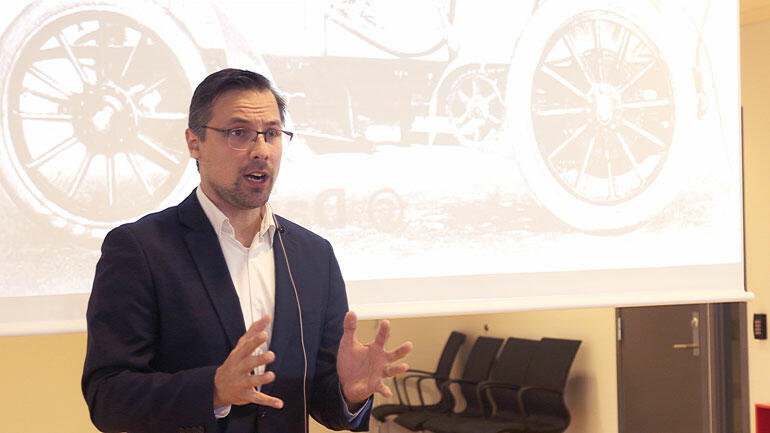After working five years in industry and finishing his Master of Science in Computer Science at Delft University of Technology, Steven Bos felt ready for a higher academic challenge: a PhD.
He came across what he describes as “a dream job opening” at USN on LinkedIn: PhD Research Fellow in robotics for disaster management and SAR.
– Why did you choose USN?
– The PhD position was appealing since it required novel research in the fields of AR, AI, snake robots and smart buildings, all themes that I believe will have significant impact on our lives for the next 50+ years.
After the first Skype meeting with his three supervisors and Head of Department, Steven grew confident that USN would be able to support what he describes as “the long and risqué journey of PhD life”.
– The next day I announced to quit my job two months later.
– How do you like working with USN?
– The first three months working at USN has been amazing. I gave a lunch lecture on AI, became a member of IEEE and the Norwegian AI Society and reviewed a few papers for both, assisted four MSc students daily and revitalized several old engineering projects of my professors for future opportunities.
Steven’s proudest moment so far was when got the opportunity to give a live-demo and presentation for the private sector as an invited speaker at an Augmented Reality-conference hosted by Kongsbergskolen:
– In just these three months I sat down with senior managers from IBM, Microsoft, Kongsberg Defence, Sintef and TechnipFMC and listened for opportunities. I sincerely hope my PhD in autonomous snake robotics for search and rescue can contribute to industry and society.
– What part of the job do you value the most?
– Like many scientists, working on your topic of interest with complete freedom will get you out of bed any day of the week. It’s great to see top IEEE journals reference USN faculty staff and the next day sit in the office of that colleague discussing your problem at hand. I have met many graduate students in my career that fight for the attention of their supervisors, but I have daily lunches and coffee meetings with my professors.
Finally, there is “the magic of Norway” that is automatically tied to my job in Kongsberg. Kongsberg being the self-proclaimed “City of Autonomy” and having a test arena for autonomous cars, boats, drones and other vehicles is very inspiring. The many months of snow and rugged landscape, offers the hardest conditions to train autonomous AI. To encounter the small yellow autonomous bus during my commute to the campus is picture worthy.
– What has surprised you?
– One of the things that surprised me is the vast equipment available to graduate students, especially engineering students. I learned that imagining a novelty is one thing but the proof is in the tasting. Access to 3D printers, laser cutters, CNC machines, the drone lab, the new robotics lab of Tinius Olsen, AR/VR lab and a cluster of computers for simulation. They are key ingredients for a PhD in robotics.
– How was your transition to Norway?
– From job application to welcome in Norway, USN ticked all the boxes! The 20 hour long drive to Norway was stunning: I got to know Norway in its coldest period and was late for my first day at work due to heavy snowfall on the train tracks. Even so, I was warmly welcomed by all my new colleagues.
Steven does admit that the transition was a bit troublesome for him as a Dutchman:
– First, immigration requires you to visit an immigration office in Norway in person. Second, they employ a catch-22: to apply for an identity number, you need a Norwegian place of residency, but to get a rental contract with Norwegian bank securities you need an identity number. I was very fortunate that the HR department at USN and my landlord were very cooperative. The recommendation HR gives is to start as soon as possible with your visa work, especially your Norwegian Identity Number. This is a golden advice for all future foreign students and staff.
– What are your future aspirations?
– My ambition is straightforward: successfully completing my doctoral research at USN and have fun while doing it. It brings me one step closer to a career in research, trying to understand the world with snake robots.
Stevens greatest aspiration within his PhD is to have one or two stays at top research groups abroad:
– My dream would be to help a space agency like NASA or ESA with deploying multi-purpose snake robots for aiding their rovers.
